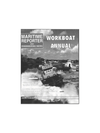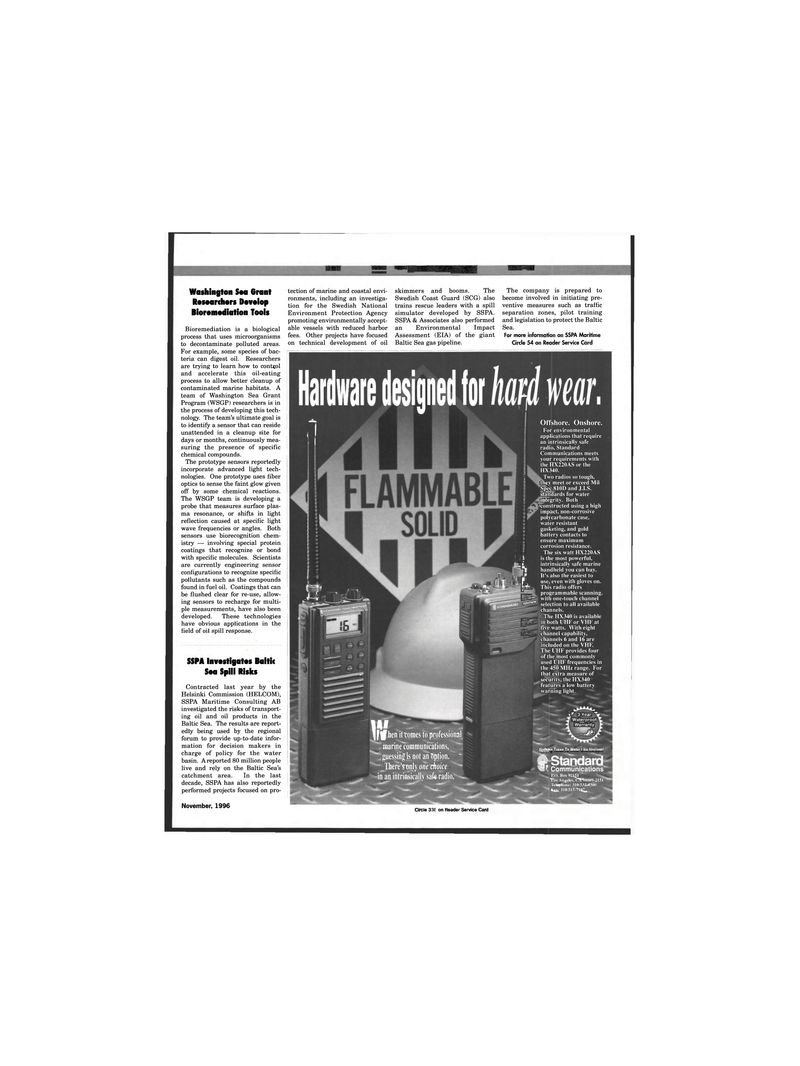
Page 113: of Maritime Reporter Magazine (November 1996)
Read this page in Pdf, Flash or Html5 edition of November 1996 Maritime Reporter Magazine
•MB mm mm agm pKHfll aMpapi
Washington Sea Grant
Researchers Develop
Bioremediation fools
Bioremediation is a biological process that uses microorganisms to decontaminate polluted areas.
For example, some species of bac- teria can digest oil. Researchers are trying to learn how to control and accelerate this oil-eating process to allow better cleanup of contaminated marine habitats. A team of Washington Sea Grant
Program (WSGP) researchers is in the process of developing this tech- nology. The team's ultimate goal is to identify a sensor that can reside unattended in a cleanup site for days or months, continuously mea- suring the presence of specific chemical compounds.
The prototype sensors reportedly incorporate advanced light tech- nologies. One prototype uses fiber optics to sense the faint glow given off by some chemical reactions.
The WSGP team is developing a probe that measures surface plas- ma resonance, or shifts in light reflection caused at specific light wave frequencies or angles. Both sensors use biorecognition chem- istry — involving special protein coatings that recognize or bond with specific molecules. Scientists are currently engineering sensor configurations to recognize specific pollutants such as the compounds found in fuel oil. Coatings that can be flushed clear for re-use, allow- ing sensors to recharge for multi- ple measurements, have also been developed. These technologies have obvious applications in the field of oil spill response.
SSPA Investigates Baltic
Sea Spill Risks
Contracted last year by the
Helsinki Commission (HELCOM),
SSPA Maritime Consulting AB investigated the risks of transport- ing oil and oil products in the
Baltic Sea. The results are report- edly being used by the regional forum to provide up-to-date infor- mation for decision makers in charge of policy for the water basin. A reported 80 million people live and rely on the Baltic Sea's catchment area. In the last decade, SSPA has also reportedly performed projects focused on pro- tection of marine and coastal envi- ronments, including an investiga- tion for the Swedish National
Environment Protection Agency promoting environmentally accept- able vessels with reduced harbor fees. Other projects have focused on technical development of oil skimmers and booms. The
Swedish Coast Guard (SCG) also trains rescue leaders with a spill simulator developed by SSPA.
SSPA & Associates also performed an Environmental Impact
Assessment (EIA) of the giant
Baltic Sea gas pipeline.
The company is prepared to become involved in initiating pre- ventive measures such as traffic separation zones, pilot training and legislation to protect the Baltic
Sea.
For more information on SSPA Maritime
Circle 54 on Reader Service Card
November, 1996 115 Circle 325 on Reader Service Card
Offshore. Onshore.
For environmental applications that require an intrinsically safe radio, Standard
Communications meets your requirements with the HX220AS or the
HX340. j. Two radios so tough, they meet or exceed Mil
Spec 810D and J.I.S. standards for water integrity. Both ! constructed using a high - mjt impact, non-corrosive polycarbonate case, water resistant gasketing, and gold battery contacts to ensure maximum corrosion resistance.
The six watt HX220AS
I" is the most powerful, i intrinsically safe marine *f handheld you can buy. - It's also the easiest to
F use, even with gloves on. jflbk This radio offers programmable scanning, jSps® with one-touch channel
S"M5**' selection to all available channels.
The HX340 is available g§r in both XJHF or VHF at five watts. With eight ||fff channel capability, channels 6 and 16 are included on the VHF.
The UHF provides four of the most commonly used UHF frequencies in the 450 MHz range. For that extra measure of security, the HX340 features a low battery warning light. r 3 Year ~
Waterproof
Warranty [jf hen ittomes to professional marine communications, guessinfis not anfiption. -
ThereVonly one choice in an intrinsically safe radio.
Nothing Takes To Water Like Horizon!
I Communications
P.O. Box 92141 '*
T<8 Angeles. CS*90009-2151
Telephone: 310/53 2-3300 tax; 310/515-714!^

 112
112

 114
114
